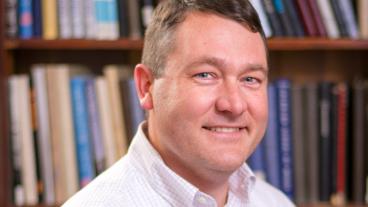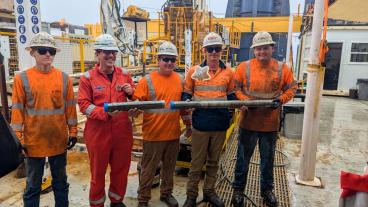This story appears in the Fall/Winter 2013 issue of Mines magazine.
Seven years into his presidency, with plenty of milestones on record, a capital campaign in full swing, and some big changes on the horizon for Mines, we recently sat down with President Scoggins for an informal Q&A. Partly retrospection, partly introspection and partly forward-looking, the conversation that follows will be of interest to all those who support the growth and success of Mines, and are curious to learn more about its president.
Mines: Nearly seven years ago, you transitioned from the corporate world to academia. What motivated your decision?
Scoggins: Not too long before I retired after more than 35 years in the oil and gas industry, I joined the board of trustees of my alma mater, the University of Tulsa. After I retired, I became increasingly active, serving on the executive committee and spending a great deal of time on campus. My wife and I both enjoyed the experience of being involved in the university. When I received the call from Mines asking me to consider being a candidate, I realized this was an opportunity to be part of a remarkable community.
Mines: What aspects of leading Mines do you find most rewarding?
Scoggins: The most rewarding moments revolve around students—seeing them be successful. I’m getting ready to participate in my 15th commencement, so I have had the opportunity to watch many wonderful students walk confidently across the stage, proud of their accomplishment, and poised to make great contributions to society. It’s very special to be a part of that.
I recently heard about an alumnus who is about to graduate from the University of Texas with master’s degrees in environmental engineering and public policy. At Mines, he was a lineman on the football team, and we got to know each other a little. Whenever he saw me on campus, he’d ask, “You gonna come to the game this weekend?” At his graduation, just before I handed him his diploma, I called out his jersey number and said, “James Tyree, #65, you did a hell of a job.” I got the biggest bear hug I think any president’s ever gotten during a college graduation ceremony.
Karen and I try to attend as many student activities as possible—from athletic events to plays and concerts—and we enjoy them all. I particularly enjoy the graduate research conference and looking at the students’ posters, even though I have to admit I really don’t understand all of them.
Really, the most rewarding aspect of my job is seeing the growth in our students over their time at Mines, which is a testament to their own hard work and to the dedication of the Mines faculty and staff who teach and interact with them.
Mines: When you speak to individuals or groups less familiar with the university, how do you make “the case for Mines”? What does the university have to offer that sets it apart?
Scoggins: I talk about the focused nature of the school’s mission, the quality of the education our students receive, and the relevance of our research programs. Mines is uniquely positioned to deal with global challenges related to our focus areas of earth, energy and environment. These issues are at the forefront of the world’s most pressing concerns, and Mines is playing a critical role in educating students who will be leaders in addressing them—through their careers and through meaningful research.
I also always point out something you will hear from almost every Mines alum—and that I completely agree with—which is that our students develop a work ethic unlike almost any other university. By the time they graduate, our students truly have the skills to hit the ground running. They are a very special group.
Mines: The financial crisis erupted relatively early in your presidency. This must have posed some significant challenges.
Scoggins: When I interviewed for the position, the board of trustees indicated they wanted a lot of focus on the school’s financial condition. When I arrived, Mines was already in the process of putting together the all-funds budget. We tightened down our systems, controlled our costs and planned carefully. As a result, we have managed to weather some major cutbacks in state funding. We faced some financial challenges, but the school came through it with minimal adverse impacts...
Read the rest of the story on the Mines magazine website.



